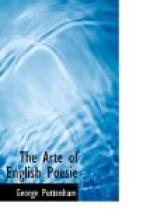For these respectes the auncient reformers of language,
inuented, three maner of pauses, one of lesse leasure
then another, and such seuerall intermissions of sound
to serue( besides easment to the breath) for a treble
distinction of sentences or parts of speach, as they
happened to be more or lesse perfect in sence.
The shortest pause or intermission they called comma
as who would say a peece of a speach cut of.
The second they called colon, not a peece but
as it were a member for his larger length, because
it occupied twice as much time as the comma.
The third they called periodus, for a complement
or full pause, and as a resting place and perfection
of so much former speach as had bene vttered, and
from whence they needed not to passe any further vnles
it were to renew more matter to enlarge the tale.
This cannot be better represented then by example of
these common trauailers by the hie ways, where they
seeme to allow themselues three maner of staies or
easements: one a horsebacke calling perchaunce
for a cup of beere or wine, and hauing dronken it
vp rides away and neuer lights: about noone he
commeth to his Inne, & there baites him selfe and
his horse an houre or more: at night when he can
conueniently trauaile no further, he taketh vp his
lodging, and rests him selfe till the morrow:
from whence he followeth the course of a further voyage,
if his business be such. Euen so our Poet when
he hath made one verse, hath as it were finished one
dayes iourney, & the while easeth him selfe with one
baite at the least, which is a Comma or Cesure
in the mid way, if the verse be euen and not odde,
otherwise in some other place, and not iust in the
middle. If there be no Cesure at all, and
the verse long, the lesse is the makers skill and
hearers delight. Therefore in a verse of twelue
sillables the Cesure ought to fall right vpon
the sixt sillable: in a verse of eleuen vpon
the sixt also leauing fiue to follow. In a verse
of ten vpon the fourth, leaving sixe to follow.
In a verse of nine vpon the fourth, leauing fiue to
follow. In a verse of eight iust in the middest,
that is, vpon the fourth. In a verse of seauen,
either vpon the fourth or none at all, the meeter
very ill brooking any pause. In a verse of sixe
sillables and vnder is needefull no Cesure at
all, because the breath asketh no reliefe: yet
if ye giue any Comma, it is to make distinction
of sense more then for any thing else: and such
Cesure must neuer be made in the middest of
any word, if it be well appointed. So may you
see that the vse of these pawses or distinctions is
not generally with the vulgar Poet as it is with the
Prose writer because the Poetes cheife Musicke lying
in his rime or concorde to heare the Simphonie, he
maketh all the hast he can to be at an end of his
verse, and delights not in many stayes by the way,
and therefore giueth but one Cesure to any verse:
and thus much for the sounding of a meetre. Neuerthelesse




